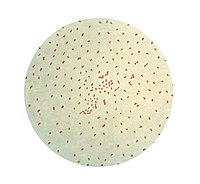
Photo from wikipedia
BACKGROUND During a pertussis epidemic in 2009, the Department of Health, Victoria, Australia, implemented a cocoon program offering parents of new babies a funded-dose of pertussis-containing vaccine. We assessed vaccine… Click to show full abstract
BACKGROUND During a pertussis epidemic in 2009, the Department of Health, Victoria, Australia, implemented a cocoon program offering parents of new babies a funded-dose of pertussis-containing vaccine. We assessed vaccine effectiveness (VE) of the program in reducing pertussis infection in infants. METHODS Using a matched case-control design, infants aged <12 months that were notified with pertussis between 1 January 2010 and 31 December 2011, and born during the time that the cocoon program was in place, were identified. Controls were matched by area of residence and date of birth. Telephone interviews we conducted to ascertain parents' vaccination status, and if vaccinated, timing of vaccination receipt relative to the birth of their baby. Odds ratios (ORs) were calculated for the association between vaccination and pertussis infection, with VE calculated as (1 - OR) × 100%. RESULTS The study recruited 215 cases and 240 controls (response rates 67% and 25% of eligible participants, respectively). Vaccination of both parents after delivery of the infant and ≥28 days prior to illness onset reduced pertussis infection by 77% (Vaccine Effectiveness [VE] = 77% (confidence interval [95% CI], 18-93%). After adjusting for maternal education, presence of a sibling within the household, and the infants' primary course vaccination status, the adjusted VE was 64% (95% CI, -58-92%). CONCLUSIONS Although not reaching statistical significance, our results demonstrated that cocoon immunisation - where both parents are vaccinated in the post-partum period - may offer some protection again infant pertussis infection. Cocoon immunisation could be considered in circumstances where antenatal vaccination of the mother has not occurred.
Journal Title: Vaccine
Year Published: 2018
Link to full text (if available)
Share on Social Media: Sign Up to like & get
recommendations!